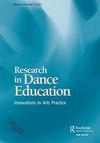将舞蹈作为一种教育工具用于心理治疗,以提高自闭症儿童的社交能力
IF 0.9
3区 艺术学
0 DANCE
引用次数: 0
摘要
为自闭症谱系障碍(ASD)儿童工作的专业人员提供的基于舞蹈使用的教育工具很少。本文旨在强调舞蹈对自闭症谱系障碍儿童的益处。本文章由计算机程序翻译,如有差异,请以英文原文为准。
The psychotherapeutic use of dance as an educational tool to improve social skills in children with autism
Educational tools based on the use of dance for professionals working with children with autism spectrum disorders (ASD) are scarce. The aim of this article is to highlight the benefits of dance th...
求助全文
通过发布文献求助,成功后即可免费获取论文全文。
去求助
来源期刊

Research in Dance Education
DANCE-
CiteScore
2.50
自引率
30.00%
发文量
35
期刊介绍:
Research in Dance Education aims to inform, stimulate lively and critical debate and promote the development of high quality research and practice in dance education. The journal is relevant to dance academics, teachers and learners. The journal includes contributors from a wide and diverse, international community of researchers. This extends to all aspects of dance in education, providing opportunities for both experienced and less experienced researchers. The journal encourages a wide range of research approaches and methods, in a forum for debate. Issues related to pedagogy, philosophy, sociology and methodology in relation to creating, performing and viewing dance in various contexts are welcome. The role and value of dance as part of arts education and the connections with other arts practitioners is also supported. The research field of Research in Dance Education includes for example: all phases of education, pre-school to higher education and beyond; teaching and learning in dance, theory and practice; embodiment; new technologies; systematic reviews of literature; professional dance artists in education; learning in and through dance; aesthetic and artistic education; dance and the arts; dance and physical education; training dance teachers: initial teacher education, continuing professional development, dance degrees, and professional dance training; examination dance; dance therapy; special educational needs; community dance and youth dance; dance in society: gender, ethnicity, class, religion, economics; psychological issues: self esteem, motivation, body image; creativity; philosophy and the arts; research methods and methodologies.
 求助内容:
求助内容: 应助结果提醒方式:
应助结果提醒方式:


